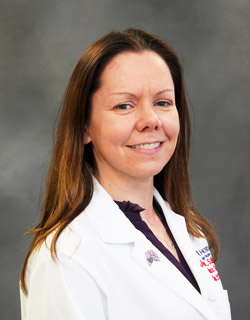New Guidelines on Lung Cancer Screening Could Save Thousands of Lives
November 19, 2020
Lung cancer is the second-most common cancer and the leading cause of cancer death in the United States. November is Lung Cancer Awareness Month, and Jennifer L. Sullivan, MD, FACS, says the number one risk factor for lung cancer hasn't changed in years.
"Smoking cigarettes is still considered the most significant risk factor," Dr. Sullivan says. "After that, it becomes harder to pinpoint the cause, but it's usually environmental exposure like secondhand smoke and chemical exposures, such as radon and asbestos."
The CDC reports that people who smoke cigarettes are 15 to 30 times more likely to get lung cancer or die from lung cancer than people who do not smoke.
Like other cancers, the earlier lung cancer is detected, the better chances are for survival and recovery. Dr. Sullivan says the problem is that lung cancer is hard to detect early.
"You don't really know you have lung cancer until it's far advanced and you get symptoms," she says. "It's rare to have an early-stage lung cancer showing symptoms because of where it's located in your lungs. Most lung cancers are picked up by a screening for something else."
Lung cancer-specific screening has only been widely available since 2010 for certain patients based on their age and smoking history. New recommendations from the U.S. Preventative Services Task Force (USPSTF) could broaden the recommendations and save thousands of lives.
"The recommended revision that's in progress would lead to 2 million more people becoming eligible for screening and could result in 3,000 more people catching and treating their lung cancer early," Dr. Sullivan says.
The new guidelines would lower the screening age from 55 to 50 and the smoking history threshold from a 30-pack year (the equivalent of a pack a day for 30 years) to a 20-pack year. The American Cancer Society is currently reviewing the recommendations and is expected to update their lung cancer screening guidelines by the end of 2020.
Dr. Sullivan is thrilled about the update but adds it's still up to the patient to schedule their screening – a potentially life-saving move.
"There are a lot of people eligible for screening who don't take advantage, and the earlier we treat lung cancer, the better. Catching cancers early works," she says.
Dr. Sullivan encourages anyone who is eligible for screening to make an appointment. While she understands some people may be nervous about being screened or treated at a hospital with COVID-19 still prevalent, she notes GBMC is following every protocol and standard to keep patients safe. This includes proper PPE use, testing and screening before any procedure.
"I performed surgery at the height of the pandemic because a patient wanted their cancer out, and we're now scheduling surgeries regularly. GBMC has great control and planning to get patients through their screening or surgical process without exposure," Dr. Sullivan says.
Learn more about lung cancer screening and treatment options available at GBMC at www.gbmc.org/lung.




